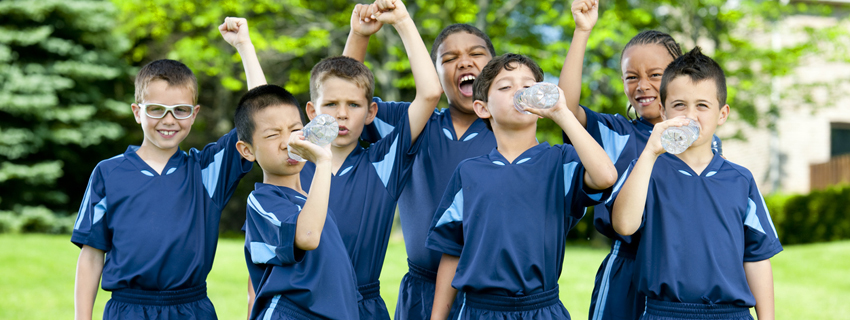Proper hydration in youth sports can be easily overlooked, but it’s important to keep in mind. Kids are often in warm environments when they participate in sports – on a field on a hot summer day, in a stuffy gym, or buried under layers of heavy protective equipment on the ice. These situations can lead to heavy sweating, and if that fluid isn’t replaced, young athletes could be at risk for dehydration.
Just like in adults, dehydration can be a very serious medical issue for children. Use this guide to ensure your youth athletes are properly hydrated, and learn to spot the signs of dehydration.
Dehydration happens when a person loses more fluids than he or she consumes. When this happens, the body doesn’t have enough water and other fluids to carry out its normal functions.
Dehydration can come with serious risks. Dehydration can potentially lead to heat illnesses, swelling of the brain, seizures, low blood pressure, kidney failure, and in rare cases, severe dehydration could result in a person falling into a coma.
The National Alliance for Youth Sports reported that “up to 75 percent of young athletes aged 8 to 18 come to practice already dehydrated, according to researcher Dr. Susan Yeargin from the University of South Carolina.”
Sweating during the day and not drinking enough liquids can lead to a dehydrated state even before youth athletes become active. As kids lose more fluids while participating in athletic events, their level of dehydration can increase if they are not replacing the lost liquids.
Even if an athlete’s dehydration level is not enough to cause a medical issue, it could impact his or her performance on the field. According to NAYS, in children, 1 percent dehydration can cut down a player’s endurance. The website states that in a teen athlete, 2 percent dehydration can affect endurance levels and result in hindered alertness and cognitive function.
Tips for keeping youth athletes hydrated
To avoid potentially serious medical complications, it’s important to keep young athletes hydrated. During particularly long or strenuous practices, or in hot or humid conditions, athletes need to take precautions to avoid dehydration.
The following safety measures should be taken by coaches and teams to keep athletes hydrated:
- Insist athletes drink plenty of fluids before and during athletic activities
- Encourage athletes to wear light and loose-fitting clothing
- Avoid holding practice or playing games during the hottest part of the day
- End or cancel practice and games early if needed
- If available, move practice or games to a shaded or indoor area
- Make sure fluids are available for athletes at all times
HCA Midwest Health is the official healthcare provider for Heartland Soccer Association and we work with parents and coaches to keep athletes safe and on the field of play year round, learn more about our services at www.hcamidwest.com

